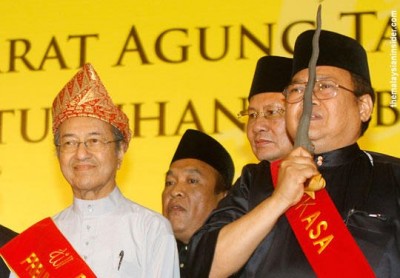Dr. Marzuki Mohamed, ANU alumnus, and advisor to the Deputy Prime Minister of Malaysia recently argued that Malaysia is NOT a secular state.
The timing of Dr. Marzuki’s assertions of course fits a larger strategy undertaken by the ruling party: to use religion as a wedge between Muslims and non-Muslims in general, but also between the parties in the opposition coalition, especially the Islamist PAS, and the social democrats, DAP. Islam is also of course used to ensure compliance, and to stifle dissent.
Having next to nothing to rely on: suffering from massive deficits on the leadership and policy front, and with an increasingly debilitating track record in the economic, social and political front, this is indeed a sound strategy as there are sufficient number of Malaysians, and especially Malaysian Muslims to fall for this – that UMNO is the protector and the guarantor of the sanctity of Islam. To paraphrase and slightly modify Samuel Johnson, “religion is indeed the last refuge of a scoundrel.”
Another ANU alumnus, Dr. Kikue Hamayotsu, give credence to the argument that Islam is used simply as a means to ensure the continuation of this corrupt regime. In her article, she argues that:
It is commonly assumed that greater enforcement of Syariah [Islamic law] is the result of growing Islamism in civil society and/or the state. This article investigates the most burning political issue relating to the state enforcement of Syariah in contemporary Malaysia, that of apostasy. The author argues that it is the electoral imperative of the secular Muslim ruling elites, especially prime ministers, to cultivate broader support to achieve political survival, not only among their traditional power base in the rural Muslim constituencies, as is conventionally argued, but equally importantly among the urban non-Muslim (especially Chinese) constituencies, which has also conditioned the state enforcement of Syariah. The author’s findings from Malaysia and observations on Indonesia further suggest that electoral competitiveness – rather than authoritarianism or theocracy – conditions state enforcement of Syariah, contrary to expectations.
In an earlier posting on New Mandala, Dr. Ahmad Farouk Musa had argued that Islam would flourish best only under a secular state.
It never ceases to amaze me, that there are still sufficient number of Muslims who actually believe that they can, and should be legislated to heaven!
 Facebook
Facebook  Twitter
Twitter  Soundcloud
Soundcloud  Youtube
Youtube  Rss
Rss 